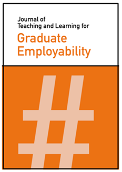Transdisciplinary employability practitioners: Engaging with skills for the future and redefining professional identity
DOI:
https://doi.org/10.21153/jtlge2024vol15no2art2017Keywords:
Transdisciplinary, work-integrated learning, lifelong learning, boundary-crossing, employability, professional development, career learning, higher educationAbstract
In response to the need for graduates to tackle global, complex problems, higher education is increasing attention towards approaches that cross the boundaries of disciplinary thinking. However, while students can benefit from learning across disciplines, employability practitioners can also benefit. Transdisciplinary approaches can prompt practitioners to rethink career education, take charge of their professional development, and redefine their identity as borderless, ever-evolving transdisciplinary employability practitioners. Within this provocation, a transdisciplinary approach to learning is introduced and questions pertinent to the seven habits of a transdisciplinary mind are posed, intended to provoke converging perspectives on employability. By refocusing practitioners’ employability perspectives, higher education can enhance its capacity for career-led learning and transform the identities of those working within it.References
Australian National University. (2024). Human Ecology. https://programsandcourses.anu.edu.au/2024/minor/HECL-MIN
Brewer, M., Ferns, S., Lewis, S., Childers, J., & Russell, L. (2020). Interdisciplinary project-based work-integrated learning: The Australian good practice guide. Australian Technology Network. https://multisectorprojects.com/wp-content/uploads/2020/05/Good-Practice-Guide-2020.pdf
Cawood, R., Roche, J., Ong, A., Sharma, D., Mulder, A., Jones, L., Ta, D., & Kirkhope, J. (2018). Can the universities of today lead learning for tomorrow? The University of the Future. Ernst & Young Australia. https://assets.ey.com/content/dam/ey-sites/ey-com/en_au/topics/government-and-public-sector/ey-university-of-the-future-2030.pdf
Engeström, Y., Engeström, R., & Kärkkäinen, M. (1995). Polycontextuality and boundary crossing in expert cognition: Learning and problem solving in complex work activities. Learning and instruction, 5(4), 319-336. https://doi.org/10.1016/0959-4752(95)00021-6
McGregor, S. L. (2004). The nature of transdisciplinary research and practice. Kappa Omicron Nu Human Sciences Working Paper series. https://publications.kon.org/resources/the-nature-of-transdiscipliary-research-and-practice.html
McGregor, S. L. T.(2015). Transdisciplinary Knowledge Creation. In: P. Gibbs (Ed.) Transdisciplinary Professional Learning and Practice (pp. 9-24). Springer. https://doi.org/10.1007/978-3-319-11590-0_2
McGregor, S. L. T. (2017). Transdisciplinary Pedagogy in Higher Education: Transdisciplinary Learning, Learning Cycles and Habits of Minds. In: P. Gibbs (Ed.) Transdisciplinary Higher Education, (pp. 3-16) Springer. https://doi.org/10.1007/978-3-319-56185-1_1
Middlehurst, R. (2009). Developing higher education professionals: Challenges and possibilities. In C. Whitchurch and G. Gordon (Eds.) Academic and Professional Identities in Higher Education: The Challenges of a Diversifying Workforce (pp. 223–243). https://doi.org/10.4324/9780203865255
Mishra, P., Koehler, M. J., & Henriksen, D. (2011). The seven trans-disciplinary habits of mind: Extending the TPACK framework towards 21st century learning. Educational Technology, 51(2), 22-28. https://www.jstor.org/stable/44429913
Monash University. (2024). Developing transdisciplinary pedagogies. Faculty of Education Handbook https://handbook.monash.edu/2024/units/EDF3075?year=2024
Nghia, T. L. H., Bui, B. C., Singh, J. K. N., & Lu, V. N. (2022). Graduate Employability Across Contexts: Perspectives, Initiatives and Outcomes. Springer. https://doi.org/10.1007/978-981-19-3959-4
RMIT University. (2024). Indigenous Research Network. https://www.rmit.edu.au/research/our-research/enabling-impact-platforms/eip-networks/indigenous-research-network
Small, L., Shacklock, K., & Marchant, T. (2018). Employability: a contemporary review for higher education stakeholders. Journal of Vocational Education & Training, 70(1), 148-166. https://doi.org/10.1080/13636820.2017.1394355
The University of Adelaide. (2024). COMP SCI 7214OL – Human-Centred Security. Course outline. https://www.adelaide.edu.au/course-outlines/110790/1/online-2/
The University of Melbourne. (2024). IB PYP Advanced (EDUC90260). Course outline. https://handbook.unimelb.edu.au/2024/subjects/educ90260
The University of Queensland. (2019). Research impact. https://www.uq.edu.au/research/impact/stories/designing-transdisciplinary-research-for-impact/
The University of Sydney. (2024). BUSS6105: Leading in a Post-Crisis World. Unit outline https://www.sydney.edu.au/units/BUSS6105
The University of Western Australia. (2024). Wicked Problems [SVLG5003]. Course outline. https://handbooks.uwa.edu.au/unitdetails?code=SVLG5003
Top Universities. (2024). QS World University Rankings 2025: Top global universities. QS Quacquarelli Symonds Limited. https://www.topuniversities.com/world-university-rankings?region=Oceania&countries=au
University of Technology Sydney. (2023). Transdisciplinary Innovation. Course outline. https://www.uts.edu.au/study/transdisciplinary-innovation
UNSW Sydney. (n.d.). Media & communications. Research strengths. https://www.unsw.edu.au/arts-design-architecture/our-schools/arts-media/our-research/research-strengths/media-communications
Veles, N., & Carter, M.-A. (2016). Imagining a future: changing the landscape for third space professionals in Australian higher education institutions. Journal of Higher Education Policy and Management, 38(5), 519-533. https://doi.org/10.1080/1360080X.2016.1196938
Downloads
Published
Issue
Section
License
Copyright (c) 2024 Adrian Buck

This work is licensed under a Creative Commons Attribution-NonCommercial 4.0 International License.












